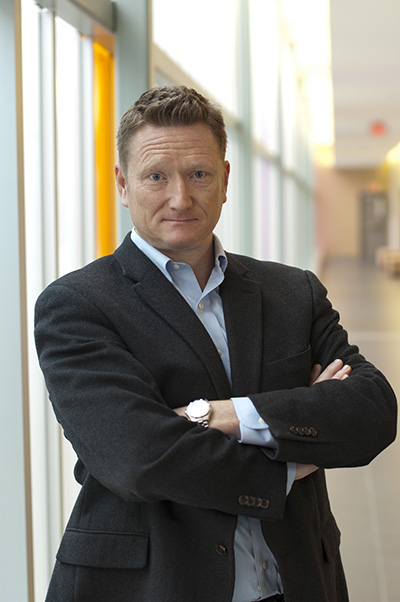By converting fast-twitch muscles to slow-twitch muscles, a team of UBC researchers have alleviated the symptoms of amyotrophic lateral sclerosis (ALS) in mice.
ALS, also known as Lou Gehrig’s disease, is a progressive neurodegenerative disorder that affects the neurons that transmit electrical impulses from the brain to the muscles in the body. When the muscles don’t receive messages from the brain, they lose strength and die, leading to weakness and paralysis. ALS progresses rapidly – people with ALS usually die within two to five years of receiving a diagnosis — and two to three Canadians die of ALS every day.
A team led by Blair Leavitt, a Professor in the Department of Medical Genetics and a Principal Investigator at the Centre for Molecular Medicine and Therapeutics, focused on the fact that fast-twitch muscles — which contract quickly but get fatigued very quickly — are more vulnerable in ALS than slow-twitch muscles, which contract more slowly but for longer periods of time. Sprinters rely primarily on fast-twitch muscles, while marathon runners depend mostly on slow-twitch muscles.
His team at CMMT used a form of gene therapy to convert fast muscles in the legs of a mouse model of ALS to the slow type. In an article published last month in Nature Communications, they reported that mice that received this procedure scored better on a test of motor function than mice that received a sham procedure. In addition, mice that received the procedure had 66 per cent more motor neurons in a section of their spinal cord compared with the sham treated mice, suggesting that the treatment helped preserve these critical neurons.
Using another form of gene therapy to switch muscle in the opposite direction (from slow to fast) had the reverse effect causing mice to become impaired faster, lose more neurons, and to have decreased survival.
“While we carried out our study in mice, this study has relevance to human treatments for ALS,” Dr. Leavitt says. “A major pharmaceutical company is developing a gene therapy based on our findings that could eventually be used in human clinical trials.”
This research was supported by grants from the Canadian Institutes of Health Research in collaboration with the Muscular Dystrophy Association of Canada and the ALS Society of Canada.
